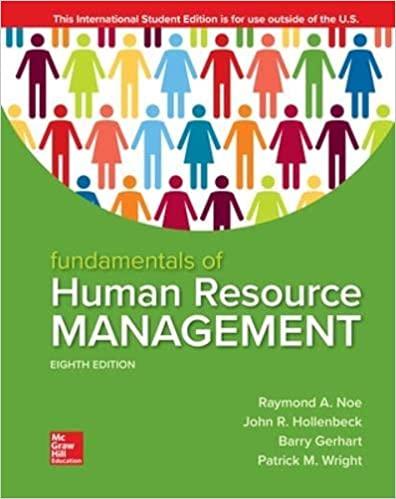Consider a situation where a new sales associate complains that a top-earning sales manager has been harassing
Question:
Consider a situation where a new sales associate complains that a top-earning sales manager has been harassing her. Who would be affected by
(a) a decision to fire the sales manager; and
(b) a decision to tell the employee the manager is valuable, and she should figure out how to handle the situation herself?
The roles of HR professionals can be complex. The HR goal of equipping the organization with a well-qualified, highly motivated workforce should be consistent with managers'
and the organization's goals for business performance. But at the level of particular decisions, employees and managers may not see much alignment between their positions. Decisions about pay, for example, affect the employee's wallet and the company's bottom line in opposite ways. HR professionals develop skills in navigating these differences with clear expectations and accurate data, so both parties feel they have been treated fairly.
Experienced HR professionals advise that most of these conflicting sets of expectations can be resolved by putting the company's long-term value ahead of any quick wins for a particular employee or manager. Managers generally understand that treating employees fairly and honestly is in the company's long-term interest, and employees generally understand that the company has to set spending limits in order to survive.
Ethical challenges arise for HR practitioners in the less common situations where managers fail to align their interests with the company's. This problem arises when an employee complains that a highly valued manager or employee has been engaging in harassment. If the HR professional conducts an investigation and finds evidence of misconduct, executives may hesitate to take action against the valuable harasser. They may pressure the HR department to let it go or simply move one of the parties to another department. They may press to keep the story quiet, which means other victims will miss a chance to come forward and future victims will have no warning.
In these situations, HR professionals are caught between doing what serves the executives who want to maintain the status quo and doing what serves the employee who spoke up. Victims have complained that the usual choice is to serve the executives, so some do not bother to speak up about misconduct-thus contributing to a climate in which misdeeds continue.
Step by Step Answer:

ISE Fundamentals Of Human Resource Management
ISBN: 9781260565768
8th International Edition
Authors: Raymond Noe, John Hollenbeck, Barry Gerhart, Patrick Wright





